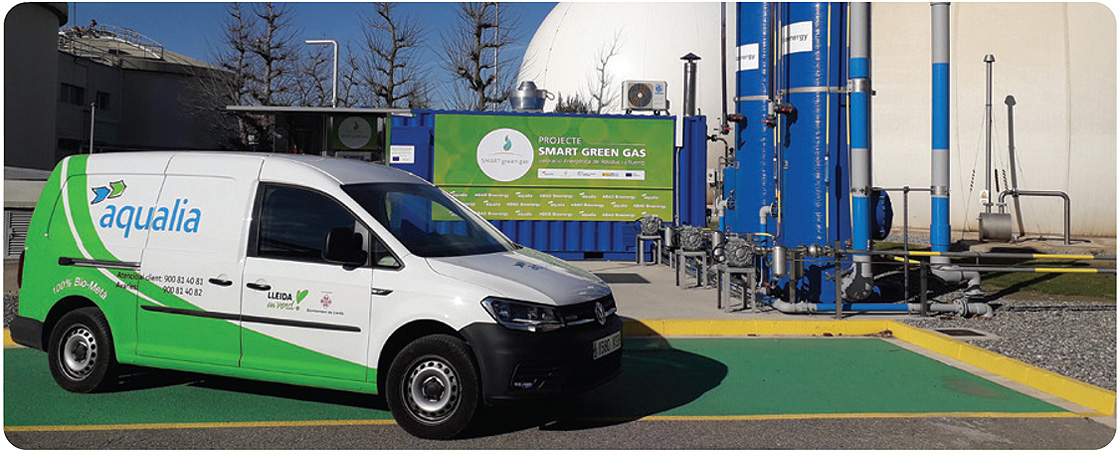Water is one of nature’s most valuable resources and a key ally in the transition to a green and decarbonised economy. The treatment of wastewater allows the production of cleaner energy: biogas, a renewable gas that is less polluting than conventional fuel, which can be used to power vehicles and in the generation of heat and electricity. A new biogas cleaning and upgrading process is currently being demonstrated in many wastewater treatment plants (WWTP) in Spain to produce biomethane.
The use of biogas reduces emissions from industry, transport and housing, and combats climate change to meet No.13 of the UN Sustainable Development Goals (SDGs), also No. 7, focused on affordable and clean energy. This goal can be achieved in synergy with objective 6 of the 17 SDGs, sustainable and democratic water management, to provide safe drinking water to the three out of every ten people in the world still lacking access to it.
Companies like Aqualia, serving more than 25M users around the world, are applying energy efficient and economical solutions to change towards a low emission society. In 2014 it became the first water company in Spain to calculate the carbon footprint of all its activity and register it with the Spanish Office for Climate Change. This allows the company to forecast and globally account for the CO2 emissions produced by all its activities, and reduce its impact.
Aqualia has several projects aimed at removing pollutants from the wastewater produced in our homes and transforming it into biogas to move vehicles. The latest project to join this list has been Ulises*, based in Almería, and co-funded by the LIFE Programme of the European Union to promote the environment and to prevent climate change. In the last year, Aqualia has increased the production of this renewable gas in various of its 20 larger wastewater treatment plants, with a potential to power a fleet of up to 10,000 vehicles.
To facilitate this, the company has developed a biogas purification process called ABAD Bioenergy. The objective of this patented procedure is to clean and enrich at low cost the raw biogas obtained from the fermentation of the sludge resulting from the treatment of urban wastewater.
This system to produce biomethane has been selected by the Ministry for Ecological Transition as part of the Carbon Fund for a Sustainable Economy (FES-CO2).
Aqualia already has four ABAD plants operating in Chiclana and Jerez (Cádiz), Lleida and Madrid, linked to the FP7 All-Gas and the SmartGreen Gas projects. Co-funded by european projects, four new plants will be installed this year, located in Madrid, Almería, Guijuelo (Salamanca), and Czech Republic. The last four will each have a biogas production capacity to fuel 90 vehicles a day. Each of these biogas plants avoids the emission of more than 50 tons of CO2 per year.

*Life Ulises project is funded with the contribution the European Union LIFE programme LIFE18 ENV/ES/000165. This article reflects only Aqualia's view. The European Commission is not responsible for any use that may be made of the information it contains.